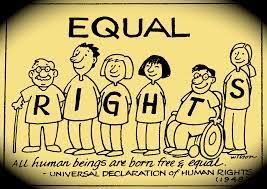Training course on Gender and Human Rights
Training Course on Gender and Human Rights is designed to empower participants with the knowledge and skills necessary to understand and advocate for gender equality and human rights.

Course Overview
Training Course on Gender and Human Rights
Training Course on Gender and Human Rights is designed to empower participants with the knowledge and skills necessary to understand and advocate for gender equality and human rights. Human rights are universal, yet the experiences of individuals can vary significantly based on their gender. This training focuses on the intersection of gender and human rights issues, emphasizing the importance of inclusive practices in promoting and protecting the rights of all individuals.
Throughout the course, participants will engage in interactive workshops, case studies, and practical exercises that will enable them to analyze human rights frameworks through a gender lens. They will develop strategies to advocate for gender equality and engage with stakeholders to promote human rights effectively. By the end of the program, participants will be equipped to lead efforts that advance gender equality and human rights within their communities and beyond.
Course Objectives
- Understand the relationship between gender and human rights.
- Analyze human rights frameworks and policies for gender sensitivity.
- Develop strategies to advocate for gender equality and human rights.
- Engage stakeholders in promoting inclusive human rights practices.
- Advocate for policies that address gender-based discrimination and violence.
- Identify gender-specific violations of human rights.
- Explore the Women, Peace, and Security (WPS) agenda and its relevance.
- Engage in community-based advocacy and empowerment initiatives.
- Build skills for effective communication and negotiation in human rights contexts.
- Create personalized action plans for implementing gender-responsive human rights initiatives.
- Evaluate the impact of cultural and social norms on gender equality and human rights.
- Develop skills in monitoring and reporting on gender-related human rights issues.
- Foster collaboration and networking among participants to create a sustainable community of practice.
Target Audience
- Human rights advocates
- Policy makers
- Gender equality activists
- Non-governmental organizations (NGOs)
- Community leaders
- Legal professionals
- Educators in human rights and gender studies
- Social workers
Course Duration: 10 Days
Course Modules
Module 1: Introduction to Gender and Human Rights
- Defining key concepts: gender, human rights, and equality.
- Overview of international human rights frameworks (e.g., CEDAW, UDHR).
- Understanding the impact of gender on human rights.
- Historical context of gender and human rights movements.
- Setting course objectives related to gender and human rights.
Module 2: Gender Analysis in Human Rights
- Techniques for conducting gender analysis in human rights contexts.
- Identifying gender-specific violations of human rights.
- Tools for collecting gender-disaggregated data on human rights issues.
- Case studies of effective gender analysis in human rights initiatives.
- Ensuring ethical considerations in data collection.
Module 3: Legal Frameworks and Gender Equality
- Understanding national and international legal frameworks for gender equality.
- Analyzing the effectiveness of laws protecting gender rights.
- Strategies for advocating for legal reforms.
- Engaging in discussions about gender-sensitive legislation.
- Case studies of successful legal advocacy for gender rights.
Module 4: Addressing Gender-Based Violence
- Understanding the prevalence and impact of gender-based violence (GBV).
- Strategies for preventing and responding to GBV.
- Creating safe and supportive environments for survivors.
- Developing comprehensive support systems for affected individuals.
- Analyzing case studies of GBV interventions.
Module 5: Intersectionality and Human Rights
- Exploring the concept of intersectionality in human rights advocacy.
- Understanding how multiple identities affect experiences of discrimination.
- Strategies for promoting inclusive human rights practices.
- Engaging diverse communities in advocacy efforts.
- Case studies of intersectional approaches in human rights.
Module 6: Community Engagement and Empowerment
- Importance of community involvement in human rights advocacy.
- Strategies for engaging communities in gender and human rights issues.
- Building capacity for grassroots advocacy and activism.
- Developing participatory approaches to human rights education.
- Analyzing successful community engagement initiatives.
Module 7: Monitoring and Evaluation in Gender and Human Rights
- Developing indicators for measuring gender outcomes in human rights initiatives.
- Tools for evaluating the effectiveness of gender-responsive human rights programs.
- Reporting on gender-related human rights impacts and achievements.
- Adjusting strategies based on evaluation findings.
- Continuous improvement in gender and human rights practices.
Module 8: Advocacy for Gender Equality and Human Rights
- Building advocacy skills for promoting gender-responsive human rights policies.
- Strategies for engaging decision-makers and influencers.
- Communicating the benefits of gender equality in human rights.
- Utilizing media and social platforms for advocacy.
- Analyzing successful advocacy campaigns.
Module 9: Building Partnerships for Gender and Human Rights
- Importance of collaboration in human rights advocacy.
- Engaging civil society and community organizations.
- Building alliances with other stakeholders and advocates.
- Sharing resources and knowledge for gender-responsive human rights initiatives.
- Case studies of successful partnerships.
Module 10: Global Trends in Gender and Human Rights
- Exploring emerging trends and challenges in gender and human rights.
- Understanding the impact of globalization on gender rights.
- Engaging with international human rights mechanisms.
- Discussing future directions for gender and human rights advocacy.
- Sharing insights and experiences from the training.
Module 11: Action Planning for Gender and Human Rights Initiatives
- Developing personalized action plans for gender-responsive human rights initiatives.
- Setting measurable goals for advocacy and activism.
- Identifying resources and support networks.
- Creating sustainability plans for ongoing gender efforts.
- Sharing action plans and receiving feedback.
Module 12: Future Directions in Gender and Human Rights
- Engaging future leaders in gender and human rights advocacy.
- Building a community of practice for ongoing learning and collaboration.
- Discussing long-term strategies for advancing gender equality and human rights.
- Evaluating personal growth and learning from the training.
- Celebrating achievements and setting future goals.